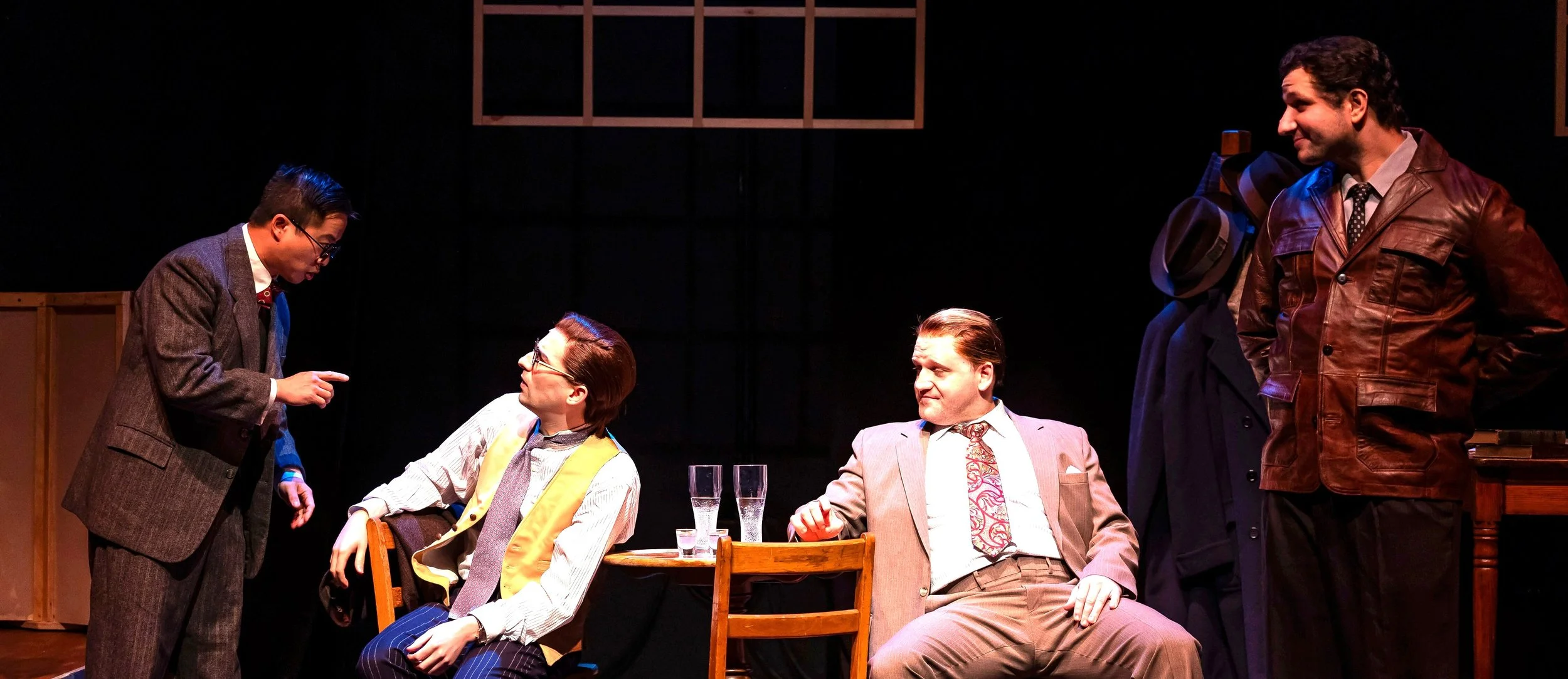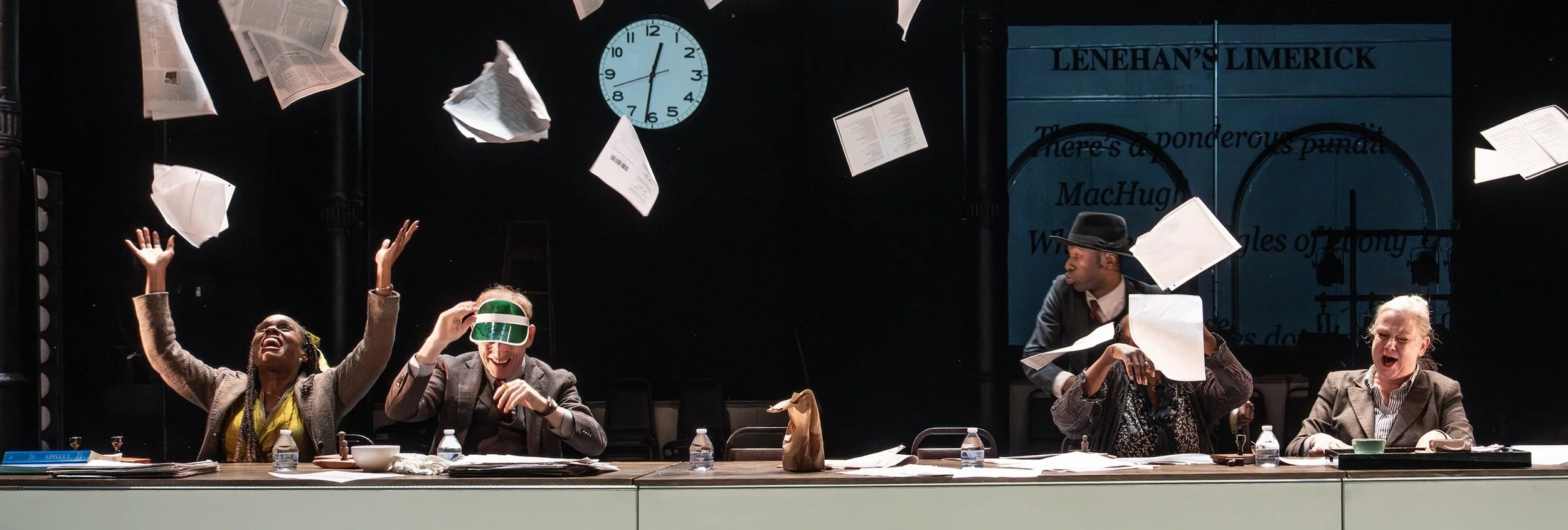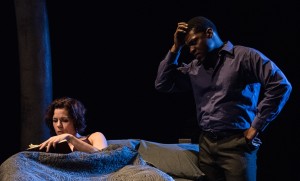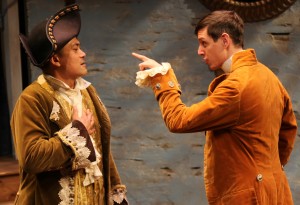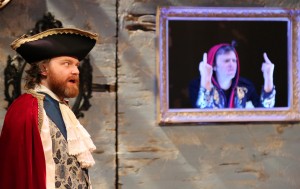So much has been written about elephants—their vast capacity for family and emotions, as well as the horrific plight of being hunted and maimed for the ivory—that it’s easy to see why Jakob G. Hoffman chose this magnificent species as a subtext for his play, A Persistent Memory. It is the story of a young, wealthy philanthropist, David Huntington (Drew Ledbetter) attempting to make sense of his issue with time and lapses of memory. Elephants and memory—two things that have a long association.
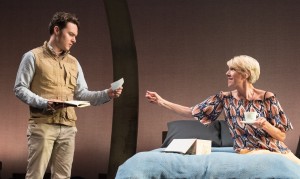
There are numerous threads of the plot that transcend time in David’s world, one where he is never without his journal. It’s difficult to know whether David journals because he’s continually trying to make sense of the difficult losses he has experienced or as an antidote to his self-diagnosed early-onset Alzheimer’s. His addiction to sugar pills to calm his nerves doesn’t appear to help. While in Uganda he meets Olivia (Victoria Vance), a middle-aged, UNICEF worker from Belgium. David’s Ugandan friend from boarding school (Richard Prioleau) has called ahead to introduce them. She tells him of new, strange behaviors by the local elephants and alludes to events that have happened in his life, which makes David uncomfortable. Regardless of what she has been told, she is attracted to him.
Elijah’s girlfriend Carly (Claire Warden) is a concert violinist with a drug problem, and while it seems they have had intense sexual relations, those have now dwindled, to Carly’s annoyance. Kasem (Ariel Estrada), a Thai man and elephant expert, is soliciting funds from David’s family foundation. He is easily angered when David mispronounces his name—it’s KAH-sam—and he walks with a limp that is never explained. Lastly, Marie (Lisa Bostnar) is the fiancée of the elder (unseen) Huntington. She wants father and son to move on from the tragedies that have upset their lives.
Hoffman attempts to address drug and alcohol addiction; sexual issues, from latent homosexuality to middle-aged crises and affairs; trauma, including murder, suicide, and death; depression; and possibly early-onset Alzheimer’s. Those are just the human issues. Stories of elephants in captivity being abused and the ravages of elephant poaching are woven throughout.
Hoffman’s non-linear approach to memory issues works well—“I thought I had already been there”—to show the nagging thoughts plaguing David. Being totally present in any situation is difficult for him. However, because none of the story lines is linear, they prove so confusing that the ending, when it comes, is unexpectedly abrupt. Both playwright and director allow the script to get lost in an abundance of stories that never dig deep enough into the meaning of existence, a question that also preys on David's mind.
Silly script details torture A Persistent Memory, specifically with regard to David and his dialogue. When Olivia hands him a picture of Lake Victoria, his commentary on Africa is childlike: “I can remember growing up, if someone would mention Africa to me, I would immediately think of Tarzan movies, apes—that sort of thing,” but he never moves into a more learned dialogue about Africa.
The redemption of A Persistent Memory is the talented, diverse cast. It is unnerving to witness Warden as Carly experiencing an overdose, and Prioleau’s subtle delivery of Elijah’s affection for David is moving. As Kasem, Estrada’s devotion to the elephants is heartfelt. Vance’s monologue in the AA meeting talking about her devotion to good vodka, neat, is clear and on point.
As David, Ledbetter shows exasperation with not only himself and others, but his lapses of memory are profound. Director Jessi D. Hill uses the actors well to create a fluid expression of time against David’s memories weaving in and out, but in the end A Persistent Memory still feels like a series of vignettes.
When a play feels like it’s not coming together, it’s easy to hear dialogue that reinforces what’s wrong with the script. In a conversation with Elijah about coming late to Carly’s violin performance, David says, “I know that doesn’t make sense, but it’s like my mind decided to log it away as something that already happened. Like a past memory. Forget it. I know it doesn’t make any sense.” And, too often, neither does A Persistent Memory.
A Persistent Memory is playing through June 18 at the Beckett Theatre (410 W. 42nd St., between 9th and 10th avenues). Evening performances are at 7 p.m. Tuesday and 8 p.m. Wednesday through Saturday; matinees are at 2 p.m. Saturday and 3 p.m. Sunday. There is an additional matinee at 2 p.m. on Tuesday, June 15. Tickets are $49.50. Due to the subject matter, this may be inappropriate for ages 12 and under. For more information and to purchase tickets visit http://www.apersistentmemory.com/


